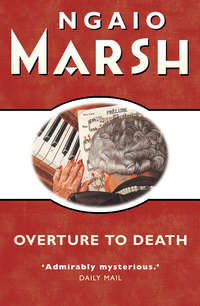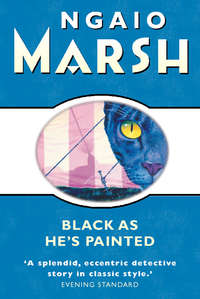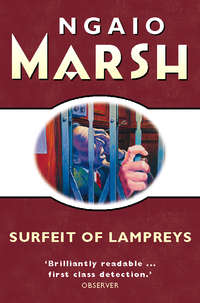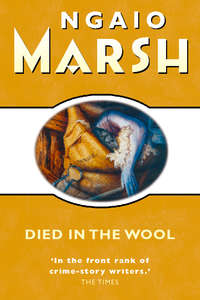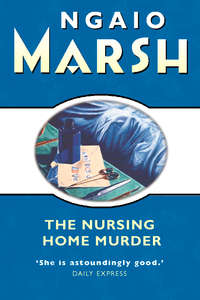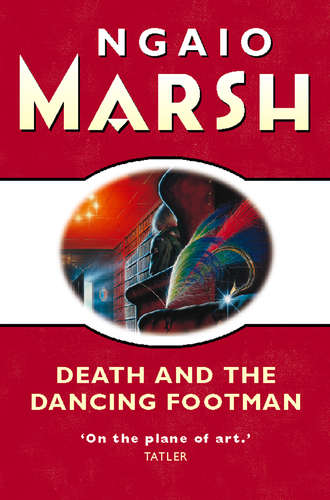
Полная версия
Death and the Dancing Footman
‘I didn’t in the least understand it, of course,’ Miss Wynne was saying, ‘but it completely unnerved me, and that’s always rather fun.’
‘Ah,’ thought Mandrake, ‘one of my plays.’
‘Of course,’ Miss Wynne continued, ‘I don’t know if you were thinking when you wrote it, what I was thinking when I saw it, but if you were, I’m surprised you got past the Lord Chamberlain.’
‘The Lord Chamberlain,’ said Mandrake, ‘is afraid of me, and for a similar reason. He doesn’t know whether it’s my dirty mind or his, so he says nothing.’
‘Ah,’ cried Jonathan, ‘is Miss Wynne a devotee, Aubrey?’
‘A devotee of what? asked Mrs Compline in her exhausted voice.
‘Of Aubrey’s plays. The Unicorn is to reopen with Aubrey’s new play in March, Sandra, if all goes well. You must come to the first night. It’s called “Bad Blackout” and is enormously exciting.’
‘A war play?’ asked Mrs Compline. It was a question that for some reason infuriated Mandrake, but he answered with alarming politeness that it was not a war play but an experiment in two-dimensional formulism. Mrs Compline looked at him blankly and turned to Jonathan.
‘What does that mean?’ asked William. He stared at Mandrake with an expression of offended incredulity. ‘Two-dimensional? That means flat, doesn’t it?’
Mandrake heard Miss Wynne give an impatient sigh, and guessed at a certain persistency in William.
‘Does it mean that the characters will be sort of unphotographic?’ she asked.
‘Exactly.’
‘Yes,’ said William heavily, ‘but two-dimensional. I don’t quite see –’
Mandrake felt a terrible apprehension of boredom, but Jonathan cut in neatly with an amusing account of his own apprenticeship as an audience to modern drama, and William listened with his mouth not quite closed and an anxious expression in his eyes. When the others laughed at Jonathan’s facetiæ, William looked baffled. Mandrake could see him forming with his lips the offending syllables ‘two-dimensional.’
‘I suppose,’ he said suddenly, ‘it’s not what you say but the way you say it that you think matters. Do your plays have plots?’
‘They have themes.’
‘What’s the difference?’
‘My darling old Bill,’ said Miss Wynne, ‘you mustn’t browbeat famous authors.’
William turned to her and his smile made him almost handsome. ‘Mustn’t you?’ he said. ‘But if you do a thing, you like talking about it. I like talking about the things I do. I mean the things I did before there was a war.’
It suddenly occurred to Mandrake that he did not know what William’s occupation was. ‘What do you do?’ he asked.
‘Well,’ said William, astonishingly, ‘I paint pictures.’
Mrs Compline marched firmly into the conversation. ‘William,’ she said, ‘has Penfelton to look after in peace time. At present, of course, we have our old bailiff, who manages very well. My younger son, Nicholas, is a soldier. Have you heard, Jonathan, that he did not pass his medical for active service? It was a very bitter blow to him. At the moment he is stationed at Great Chipping, but he longs so much to be with his regiment in France. Of course,’ she added. And Mandrake saw her glance at the built-up shoe on his club foot.
‘But you’re on leave from the front, aren’t you?’ he asked William.
‘Oh, yes,’ said William.
‘My son Nicholas …’ Mrs Compline became quite animated as she spoke of Nicholas. She talked about him at great length, and Mandrake wondered if he only imagined there was a sort of defiance in her insistence on this awkward theme. He saw that Miss Wynne had turned pink and William crimson. Jonathan drew the spate of maternal eulogy upon himself. Mandrake asked Miss Wynne and William if they thought it was going to snow again, and all three walked over to the long windows to look at darkening hills and vale. Naked trees half-lost their form in that fading light and rose from the earth as if they were its breath, already frozen.
‘Rather menacing,’ said Mandrake, ‘isn’t it?’
‘Menacing?’ William repeated. ‘It’s very beautiful. All black and white and grey. I don’t believe in seeing colour into things. One should paint them the first colour they seem when one looks at them. Yes, I suppose it is what you’d call menacing. Black and grey and white.’
‘What is your medium?’ Mandrake asked, and wondered why everybody looked uncomfortable when William spoke of his painting.
‘Very thick oil paint,’ said William gravely.
‘Do you know Agatha Troy?’
‘I know her pictures, of course.’
‘She and her husband are staying with the Copelands at Winton St Giles, near Little Chipping. I came on from there. She’s painting the rector.’
‘Do you mean Roderick Alleyn?’ asked Miss Wynne. ‘Isn’t he her husband? How exciting to be in a house-party with the handsome Inspector. What’s he like?’
‘Oh,’ said Mandrake, ‘quite agreeable.’
They had turned away from the windows, but a sound from outside drew them back again. Only the last turn of the drive as it came out of the Highfold woods could be seen from the drawing room windows.
‘That’s a car,’ said William. ‘It sounds like –’ he stopped short.
‘Is any one else coming?’ asked Miss Wynne sharply, and caught her breath.
She and William stared through the windows. A long and powerful-looking open car, painted white, was streaking up the last rise in the drive.
‘But,’ stammered William, very red in the face, ‘that’s – that’s –’
‘Ah!’ said Jonathan from behind them. ‘Didn’t you know? A pleasant surprise for you. Nicholas is to be one of our party.’
III
Nicholas Compline was an extremely striking version of his brother. In figure, height, and colouring they were alike. Their features were not dissimilar, but the suggestion of fumbled drawing in William was absent in Nicholas. William was clean-shaven, but Nicholas wore a fine blond moustache. Nicholas had a presence. His uniform became him almost too well. He glittered a little. His breeches were superb. His face was not unlike a less dissipated version of the best-known portrait of Charles II, though the lines from nose to mouth were not so dominant, and the pouches under the eyes had only just begun to form.
His entrance into the drawing room at Highfold must have been a test of his assurance. Undoubtedly it was dramatic. He came in smiling, missed his brother and Miss Wynne, who were still in the window, shook hands with Jonathan, was introduced to Mandrake, and, on seeing his mother, looked surprised but greeted her charmingly. Jonathan, who had him by the elbow, turned him towards the window.
There was no difficult silence, because Jonathan talked briskly, but there was, to a degree, a feeling of tension. For a moment Mandrake wondered if Nicholas Compline would turn on his heel and walk out, but after checking, with Jonathan’s hand still at his elbow, he merely stood stock-still and looked from William to Chloris Wynne. His face was as pale as his brother’s was red, and there was a kind of startled sneer about his lips. It was Miss Wynne who saved the situation. She unclenched her hands and gave Nicholas a coster’s salute, touching her forehead and spreading out her palm towards him. Mandrake guessed that this serio-comic gesture was foreign to her and applauded her courage.
‘Oi,’ said Miss Wynne.
‘Oi, oi,’ said Nicholas, and returned her salute. He looked at William and said in a flat voice: ‘Quite a family party.’
His mother held out her hand to him. He moved swiftly towards her and sat on the arm of her chair. Mandrake saw adoration in her eyes and mentally rubbed his hands together.
‘The Mother-fixation,’ he thought, ‘is not going to let me down.’ And he began to warn himself against the influence of Eugene O’Neill. William and his Chloris remained in the window. Jonathan, after a bird-like glance at them, embarked on a comfortable three-cornered chat with Mrs Compline and Nicholas. Mandrake, sitting in the shadow, found himself free to watch the lovers, and again he gloated. At first William and Chloris stared out through the windows and spoke in undertones. She pointed to something outside, but Mandrake felt certain the gesture was a bluff and that they discussed hurriedly the arrival of Nicholas. Presently he observed a small incident that he thought curious and illuminating. It was a sort of dumb-show, an interplay of looks subdued to the exigencies of polite behaviour, a quarter of glances. William had turned from the window and was staring at his mother. She had been talking, with an air that almost approached gaiety, to Nicholas. She looked into his face and a smile, painful in its intensity, lifted the drooping corners of her mouth. Nicholas’s laugh was louder than the conversation seemed to warrant, and Mandrake saw that he was looking over his mother’s head full at Chloris Wynne. Mandrake read a certain insolence in this open-eyed direct stare of Nicholas. He turned to see how the lady took it, and found that she returned it with interest. They looked steadfastly and inimically into each other’s eyes. Nicholas laughed again, and William, as if warned by this sound, turned from his sombre contemplation of his mother and stared first at Nicholas and then at Miss Wynne. Neither of them paid the smallest attention to him, but Mandrake thought that Nicholas was very well aware of his brother. He thought Nicholas, in some way that was clearly perceived by the other two, was deliberately baiting William. Jonathan’s voice broke across this little pantomime.
‘– a long time,’ Jonathan was saying, ‘since I treated myself to one of my own parties, and I don’t mind confessing that I look forward enormously to this one.’
Miss Wynne joined the group round the fire and William followed her.
‘Is this the party?’ she asked, ‘or are we only the beginning?’
‘The most important beginning, Miss Chloris, without which the end would be nothing.’
‘Who else have you got, Jonathan?’ asked Nicholas, with his eyes still on Miss Wynne.
‘Well, now, I don’t know that I shall tell you, Nick. Or shall I? It’s always rather fun, don’t you think,’ Jonathan said, turning his glance towards Mrs Compline, ‘to let people meet without giving them any preconceived ideas about each other? However, you know one of my guests so well that it doesn’t matter if I anticipate her arrival. Hersey Amblington.’
‘Old Hersey’s coming, is she,’ said Nicholas, and he looked a little disconcerted.
‘Don’t be too ruthless with your adjectives, Nick,’ said Jonathan mildly. ‘Hersey is ten years my junior.’
‘You’re ageless, Jonathan.’
‘Charming of you, but I’m afraid people only begin to compliment one on one’s youth when it is gone. But Hersey, to me, really does seem scarcely any older than she was in the days when I danced with her. She still dances, I believe.’
‘It will be nice to see Hersey,’ said Mrs Compline.
‘I don’t think I know a Hersey, do I?’ This was the first time Chloris had spoken directly to Mrs Compline. She was answered by Nicholas.
‘She’s a flame of Jonathan’s,’ Nicholas said. ‘Lady Hersey Amblington.’
‘She’s my third cousin,’ said Jonathan sedately. ‘We are all rather attached to her.’
‘Oh,’ said Nicholas, always to Chloris. ‘She’s a divine creature. I adore her.’
Chloris began to talk to William.
Mandrake thought that if anybody tried to bury any hatchets in the Compline armoury it would not be William. He decided that William was neither as vague nor as amiable as he seemed. Conversation went along briskly under Jonathan’s leadership, with Mandrake himself as an able second, but it had a sort of substratum that was faintly antagonistic. When inevitably, it turned to the war, William, with deceptive simplicity, related a story about an incident on patrol when a private soldier uttered some comic blasphemy on the subject of cushy jobs on the home front. Mrs Compline immediately told Jonathan how few hours sleep Nicholas managed to get, and how hard he was worked. Nicholas himself spoke of pulling strings in order to get a transfer to active service. He had, he said, seen an important personage. ‘Unfortunately, though, I struck a bad moment. The gentleman was very liverish. I understand,’ said Nicholas, with one of his bright stares at Chloris, ‘that he has been crossed in love.’
‘No reason, surely,’ said Chloris, ‘why he shouldn’t behave himself with comparative strangers.’
Nicholas gave her the shadow of an ironical bow.
Jonathan began an account of his own activities as chairman of the local evacuation committee, and made such a droll affair of it that with every phrase his listeners’ guardedness seemed to relax. Mandrake, who had a certain astringent humour of his own, followed with a description of a member of the chorus who found himself in an ultra-modern play. Tea was announced and was carried through on the same cheerful note of comedy. ‘Good Lord,’ Mandrake thought, ‘if he should bring it off after all!’ He caught Jonathan’s eye and detected a glint of triumph.
After tea Jonathan proposed a brisk walk, and Mandrake, knowing his host shared his own loathing for this sort of exercise, grinned to himself. Jonathan was not going to risk another session in the drawing room. With any luck there would be more arrivals while they were out, and the new set of encounters would take place in the propitious atmosphere of sherry and cocktails. When they assembled in the hall Jonathan appeared in a sage-green Tyrolese cape. He looked a quaint enough figure, but Chloris Wynne, who had evidently decided to like her host, cried out in admiration, and Mandrake, who had decided to like Chloris Wynne, echoed her. At the last moment Jonathan remembered an important telephone message, and asked Mandrake to see the walking-party off. He flung his cape over Nicholas’s shoulder. It hung from his shoulder-straps in heavy folds, and turned him into a Ruritanian figure.
‘Magnificent, Nick,’ said Jonathan, and Mandrake saw that Mrs Compline and Chloris agreed with him. The cloak neatly emphasized the touch of bravura that seemed an essential ingredient of Nicholas’s character. They went out of doors into the cold twilight of late afternoon.
IV
‘But,’ said Dr Hart in German, ‘it is an intolerable position for me – for me, do you understand.’
‘Don’t be ridiculous,’ said Madame Lisse in English. ‘And please, Francis, do not speak in German. It is a habit of which you should break yourself.’
‘Why should I not speak in German? I am a naturalized Austrian. Everybody knows that I am a naturalized Austrian and that I detest and abhor the Nazi régime with which we – we British – are in conflict.’
‘Nevertheless, the language is unpopular.’
‘Very well, very well, I now speak English. In plain English I tell you that if you continue your affair with this Captain Nicholas Compline I shall take the strongest possible steps to –’
‘To do what? You are driving too fast.’
‘To put an end to it.’
‘How will you do that?’ asked Madame Lisse, settling down into her furs with an air of secret enjoyment.
‘By taking you up to London next week.’
‘With what object? Here is Winton. I beg that you do not drive so fast.’
‘On our return,’ said Dr Hart, shifting his foot to the brake, ‘we shall announce our marriage. It will have taken place quietly in London.’
‘Are you demented? Have we not discussed it already a thousand times? You know very well that it would injure your practice. A woman hideous with wrinkles comes to me. I see that I can do nothing, cannot even pretend to do anything. I suggest plastic surgery. She asks me if I can recommend a surgeon. I mention two or three, of whom you are one. I give instances of your success, you are here in Great Chipping, the others are abroad or in London. She goes to you. But can I say to my client with the same air of detached assurance: “Certainly. Go to my husband. He is marvellous!” And can you, my friend, whose cry has been the utter uselessness of massage, the robbery of foolish women by beauty specialists, the fatuity of creams and lotions; can you produce as your wife Elise Lisse of the Studio Lisse, beauty specialist par excellence? The good Lady Hersey Amblington would have something to say to that. I promise you, and by no means to our advantage.’
‘Then give up your business.’
‘And halve my income, in effect our income? And, besides, I enjoy my work. It has amused me to win my little victories over the good Lady Hersey. The Studio Lisse is a growing concern, my friend, and I propose to remain at the head of it.’
Dr Hart accelerated again as his car mounted the steep road that climbed from the Vale of Pen Cuckoo up to Cloudyfold.
‘Do you see the roofs of the large house up in those trees?’ he asked suddenly.
‘That is Pen Cuckoo. It is shut up at present. What of it?’
‘And you know why it is shut up? I shall remind you. Two years ago it housed a homicidal lunatic, and her relatives have not returned since her trial.’
Madame Lisse turned to look at her escort. She saw a sharp profile, a heavy chin, light-grey eyes, and a complexion of extreme though healthy pallor.
‘Well,’ she murmured. ‘Again, what of it?’
‘You have heard of the case, of course. She is said to have murdered her rival in love. They were both somewhere between forty-five and fifty-five. The dangerous age in both sexes. I am myself fifty-two years of age.’
‘What conclusions am I supposed to draw?’ asked Madame Lisse tranquilly.
‘You are to suppose,’ Dr Hart rejoined, ‘that persons of a certain age can go to extremes when the safety of their – shall I call it love-life? – is in jeopardy.’
‘But, my dear Francis, this is superb. Am I to believe that you will lie in ambush for Nicholas Compline? What weapon shall you choose? Does he wear his sword? I believe that it is not extremely sharp, but one supposes that he could defend himself.’
‘Are you in love with him?’
‘If I answer no, you will not believe me. If I answer yes, you will lose your temper.’
‘Nevertheless,’ said Doctor Hart calmly, ‘I should like an answer.’
‘Nicholas will be at Highfold. You may observe us and find out.’
There followed a long silence. The road turned sharply and came out on the height known as Cloudyfold. For a short distance it followed the snow-covered ridge of the hills. On their right, Madame Lisse and Dr Hart looked down on the frozen woods of Pen Cuckoo; on cold lanes, on slow columns of chimney-smoke, and, more distantly, towards a long dark mass that was the town of Great Chipping. On their left the powdered hills fell away smoothly into the Vale of Cloudyfold. Under clouds that hung like a pall from horizon to horizon the scattered cottages of Dorset stone looked almost black, while their roofs glistened with a stealthy reflected light. A single flake of snow appeared on the windscreen and slid downwards.
‘Very well,’ said Dr Hart loudly, ‘I shall see.’
Madame Lisse drew a gloved hand from under the rug and with one finger touched Dr Hart lightly behind his ear. ‘I am really devoted to you,’ she said.
He pulled her hand down, brushing the glove aside with his lips.
‘You know my temperament,’ he said. ‘It is a mistake to play the fool with me.’
‘Suppose I am only playing the fool with Nicholas Compline?’
‘Well,’ he said again, ‘I shall see.’
V
Through the office window of the Salon Cyclamen Hersey Amblington watched two of her clients walk off down the street with small steps and certain pert movements of their sterns. They paused outside the hated windows of the Studio Lisse, hesitated for a moment, and then disappeared through the entrance.
‘Going to buy Lisse Foundation Cream,’ thought Hersey. ‘So that’s why they wouldn’t have a facial.’ She turned back into her office and was met by the familiar drone of driers, by the familiar smells of hot hair, setting lotion, and the sachets used in permanent waving, and by the familiar high-pitched indiscretions of clients in conversation with assistants.
‘– long after the milk. I look like death warmed up and what I feel is nobody’s business.’
‘– much better after a facial, Moddam. Aye always think a facial is marvellous, what it does for you.’
‘– can’t remember his name so of course I shall never see them again.’
‘Common woman,’ thought Hersey. ‘All my clients are common women. Damn that Lisse. Blasted pirate.’
She looked at her watch. Four o’clock. She’d make a tour of the cubicles and then leave the place to her second-in-command. ‘If it wasn’t for my snob-value,’ she thought grimly, ‘I’d be living on the Pirate’s overflow.’ She peered into the looking-glass over her desk and automatically touched her circlet of curls. ‘Greyer and greyer,’ said Hersey, ‘but I’ll be shot if I dye them,’ and she scowled dispassionately at her face. ‘Too wholesome by half, my girl, and a fat lot of good “Hersey’s Skin Food” is to your middle-aged charms. Oh, well.’
She made her tour through the cubicles. With her assistants she had little professional cross-talk dialogues, calculated to persuade her clients that the improvement in their appearance was phenomenal. With the clients themselves she sympathized, soothed and encouraged. She refused an invitation to dinner from the facial, and listened to a complaint from a permanent wave. When she returned to the office she found her second-in-command at the telephone.
‘Would Madam care to make another appointment? No? Very good.’
‘Who’s that?’ asked Hersey wearily.
‘Mrs Ainsley’s maid to say she wouldn’t be coming for her weekly facial tomorrow. The girls say they’ve seen her coming out of the Studio Lisse.’
‘May she grow a beard,’ muttered Hersey, and grinned at her second-in-command. ‘To hell with her, anyway. How’s the appointment book?’
‘Oh, we’re full enough. Booked up for three days. But they’re not as smart as they used to be.’
‘Who cares! I’m going now, Jane. If you should want me tomorrow, I’ll be at my cousin Jonathan Royal’s, Highfold, you know.’
‘Yes. Lady Hersey. It looked as if the Lisse was going away for the weekend. I saw her come out of the shop about half an hour ago and get into Dr Hart’s car. I wonder if there’s anything in those stories. She had quite a big suitcase.’
‘I wish she’d had a pantechnicon,’ said Hersey. ‘I’m sick of the sound of the wretched woman’s name. She may live in sin all over Dorset as long as she doesn’t include Highfold in the tour.’
The second-in-command laughed. ‘That’s not very likely, Lady Hersey, is it?’
‘No, thank the Lord. Goodbye, Jane.’
CHAPTER 3
Contact
I
‘Not very propitious weather for looking at a bathing pool,’ said Mandrake, ‘but I insist on showing it to you.’
He had sent the guests off at a round pace to go through Highfold woods, where the rides were heavy with sodden leaves, down to Jonathan’s model farm, and back up a steep lane to the north side of the house, where he limped out to meet them. Here they came on a wide terrace. Beneath them, at the foot of a flight of paved steps flanked by bay trees, was a large concrete swimming pool set in smooth lawns and overlooked by a charming eighteenth-century pavilion, now trimmed, like a Christmas card, with snow. The floor of the pool had been painted a vivid blue, but now the water was wrinkled, and in the twilight of late afternoon reflected only a broken pattern of repellent steely greys flecked by dead leaves. Mandrake explained that the pavilion had once been an aviary, but that Jonathan had done it up in keeping with its empire style, and that when summer came he meant to hold fêtes galantes down there by his new swimming pool. It would look very Rex Whistlerish, Mandrake said, and would have just the right air of formalized gaiety.


